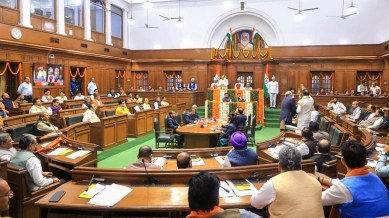Stay updated with the latest - Click here to follow us on Instagram
Drug shortage, project delays, unutilised funds: here’s what the CAG report on health services under Delhi AAP govt has flagged
Delhi Chief Minister Rekha Gupta is set to table the CAG report on health services in the House on Friday, the fourth day of the Assembly session.

Shortage of drugs in government hospitals, vacant posts of specialists and medical officers — the report by the Comptroller and Auditor General (CAG) found several issues in Delhi’s public health services under the previous AAP government.
Chief Minister Rekha Gupta tabled the report, ‘Public Health Infrastructure and Management of Health Services’, in the House Friday, the fourth day of the Delhi Assembly session.
monthly limit of free stories.
with an Express account.
It said the Delhi government did not spend some amount of the nearly 788 crore provided by the Centre for emergency response during the Covid pandemic and delayed release of funds for vaccination against the deadly infection. Under the Emergency Covid Response Plan, the Delhi government received Rs 787.91 crore (a lump sum amount of Rs 24.67 crore, Rs 292.22 crore in the first phase and Rs 471.02 crore in the second phase) from the Centre. It utilised only Rs 542.84 crore.
The report also flagged the dire state of AAP’s flagship mohalla clinics. It said 21 Aam Aadmi Mohalla Clinics did not have toilets; 15 did not have power backup; 6 did not have any table for check-up; and 12 were not accessible for the differently abled. The situation was similar at dispensaries, with 17 of the 49 inspected dispensaries having no power backup, 7 having no toilets, and 14 having no drinking water facility.
Other findings include:
Unspent funds
The Delhi State Health Mission could not utilise funds released under the National Health Mission as Rs 510.71 crore was lying unspent in the bank accounts of the Delhi State Health Society and its 11 Integrated District Health Societies till March 2022.
The report also said the Health Management Information System, which serves as a tool for monitoring the performance of health systems, was found containing inconsistent and erroneous data and did not represent actual status of implementation for proper monitoring of the programme.
No medicines
There was a shortage of injections for rare and fatal diseases like haemophilia and rabies, and hospitals failed to evaluate the need for timely repair, maintenance, replacement, and condemnation of equipment.
During 2016-17 to 2021-22, the audit noted, hospitals had to procure 33-47% of drugs contained in the Essential Drug List (EDL) directly as the Central Procurement Agency (CPA) — the nodal agency responsible for procuring drugs for hospitals, mohalla clinics and dispensaries — failed to deliver them. “A lot of EDL medicines demanded by hospitals were not supplied by CPA in respect of four test-checked hospitals… and hospitals were purchasing (these) from local chemists…,” it said.
Lack of infra
The report flagged delays of up to six years in completing hospital projects — out of 8 new hospitals under construction during the audit period, only three were completed.
It added that the Delhi government did not undertake any need-based assessment to identify district-wise areas deficient in healthcare facilities.
“Against the proposed addition of 10,000 beds (Budget speech 2016-17), only 1,357 were added during 2016-17 to 2020-21. The department was unable to utilise any of the 15 plots acquired (June 2007 and December 2015) for Rs 648.05 lakh for establishing hospitals and dispensaries, despite having possession for periods ranging between six to 15 years,” it said.
Janakpuri Super Specialty Hospital and Rajiv Gandhi Super Specialty Hospital could not provide super-specialty tertiary care as envisaged in the MoU due to weak monitoring and failure to develop a viable business model.
Delhi Arogya Kosh
DAK was set up in September 2011 as a society to provide financial assistance to poor patients suffering from life-threatening diseases. According to the report, it has neither maintained scheme-wise details of beneficiaries nor regularly sought utilisation certificates or details of unspent amount lying at government hospitals.
It added that DAK did not implement online Aadhaar-based/ biometric tracking of patients to ensure proper follow-up and prevent malpractices.
One of the conditions for reimbursement of medico-legal victims’ bills is that the victim is not covered under any insurance scheme, but no mechanism was in place to check this before making payments, the report said.
– (with PTI inputs)